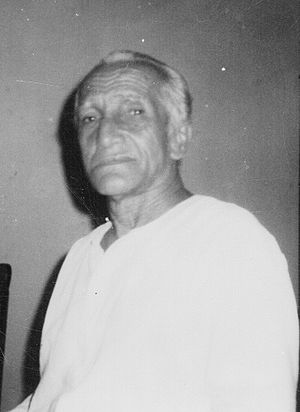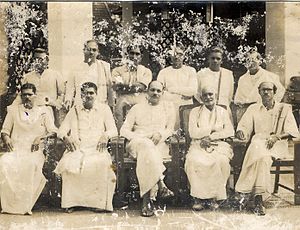Vakkom Majeed facts for kids
Quick facts for kids
S. Abdul Majeed
|
|
|---|---|

Vakkom Majeed in the 1980s
|
|
| Born | 20 December 1909 |
| Died | 10 July 2000 (aged 90) Vakkom, Thiruvananthapuram, Kerala, India
|
| Nationality | Indian |
| Other names | Vakkom Majeed |
| Political party | Indian National Congress |
| Spouse(s) | Sulekha Beevi (Late) |
| Children | 3 |
| Parent(s) | Mohamed Beevi (Mother) Syed Mohamed(Father) |
Vakkom Majeed (born S. Abdul Majeed; 20 December 1909 – 10 July 2000) was an important Indian leader. He fought for India's freedom from British rule. He was also a politician and served in the Travancore-Cochin State Assembly.
Majeed came from a well-known Muslim family in Travancore. His uncle, Vakkom Moulavi, was a big influence on him. Majeed learned from his uncle's ideas about social and political change. He helped start the Indian National Congress party in Travancore. Later, he became a Member of the Legislative Assembly (MLA) for the Attingal area from 1948 to 1952. People remember Majeed as a great Indian nationalist. He believed in politics based on good values, being fair to all religions, and caring for all people.
Contents
Who Was Vakkom Majeed's Family?
Majeed was born on 20 December 1909, in Vakkom. His family, called Poonthran, was very important and influential. They had roots in Madurai and Hyderabad. His great-grandfather and grandfather were quite modern for their time.
His uncle, Vakkom Moulavi, was a special person. He was a visionary, a social reformer, and a scholar. He also worked as an educator, writer, and journalist. He even started the Swadeshabhimani newspaper.
Majeed was the oldest of four children. His parents were Syed Mohamed and Mohamed Beevi. He had one sister, Safiya Beevi, and two brothers, Mohamed Abda and Abdul Latheef. Majeed went to St. Joseph High School in Anjengo for his early education. In 1936, he married Suleha Beevi, who was his uncle Vakkom Moulavi's niece. They had five children together.
How Did Vakkom Majeed Fight for Freedom?
Majeed was inspired by his uncle, Vakkom Moulavi, and also by Narayana Guru. He got involved in politics when he was still in school. When the Indian National Movement grew in Kerala, Majeed was one of its main leaders. He helped build the Indian National Congress in Travancore.
As a young man, he also worked hard for social reforms. Majeed was one of the few Congress leaders in Travancore who bravely joined the Quit India movement in 1942. He was arrested and stayed in jail for several months.
Later, when some people wanted "independent Travancore" (meaning Travancore would not join India), Majeed strongly opposed it. He joined protests against this idea and was put in jail again for many months. When Vakkom Kadir, a hero from the Indian National Army (INA), was sentenced to death by the British, Majeed visited him in jail. Majeed was the one who delivered Kadir's last letter to his father before he was hanged.
What Was Vakkom Majeed's Political Career Like?
Majeed was an amazing politician in Kerala during the 20th century. He strongly disagreed with the idea of dividing India based on religion. He believed that only a country where all religions were treated equally could unite everyone.
In 1948, he was elected without opposition to the Travancore-Cochin State Assembly. He represented the Attingal area. After his term ended in 1952, he decided to step away from active politics. He spent his time reading and learning a lot. He enjoyed the writings of thinkers like Bertrand Russell and M.N. Roy.
Majeed did not like strict political rules. He believed in a politics that was fair to all people and all religions. He supported modern ideas in Islam and called for freedom of thought within Islamic traditions. He also valued the ideas of Narayana Guru and believed in a society without a caste system.
Vakkom Majeed's Later Life and Passing
In his last 30 years, Vakkom Majeed spent a lot of time studying India's history and ideas about nationalism. In 1972, India celebrated 25 years of independence. The country honored Majeed with a special award called 'Tamrapatra' for his role in the Indian independence movement. He received this award from the Prime Minister at the time, Indira Gandhi.
By the late 1980s, Majeed's health started to get worse. He was bedridden for a year. His wife, Suleha Beevi, passed away on 18 June 1993. Even though his health was not good, he managed to attend some events in the late 1990s.
On 8 July 2000, he became very ill and was taken to a private clinic. His condition worsened, and he was moved to the Critical Care Unit (CCU) of Cosmopolitan Hospital in Thiruvananthapuram. On 10 July 2000, he had a heart attack and passed away at 6:30 AM. Majeed was buried in the East Jamaat Masjid (Vakkom Padinjare Jamaat Mosque) in Vakkom, next to his family members.
See also
- Vakkom Moulavi
- Justice Habeeb Mohamed


